|
Page Content
Since the publication of the first edition of the Highway Safety Manual (HSM) in 2010, many helpful resources have been developed to guide and support agencies with the implementation of HSM practices. A selection of these resources is provided below. Exploring Highway Safety Manual Crash Prediction Tools (2023)
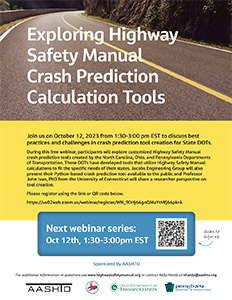
| During this webinar, participants will explore customized Highway Safety Manual crash prediction tools created by the North Carolina, Ohio, and Pennsylvania Departments of Transportation. These DOTs have developed tools that utilize Highway Safety Manual calculations to fit the specific needs of their states. Jacobs Engineering Group will also present their Python-based crash prediction tool available to the public and Professor John Ivan, PhD from the University of Connecticut will share a researcher perspective on tool creation. |
Exploring Transportation Safety Evaluation, Webinar (2021)
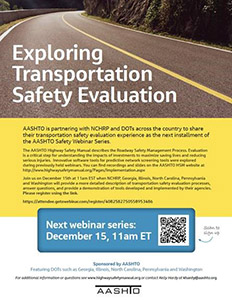
| AASHTO is partnering with NCHRP and DOTs across the country to share their transportation safety evaluation experience as the next installment of the AASHTO Safety Webinar Series. Evaluation is a critical step for understanding the impacts of investments to maximize saving lives and reducing serious injuries. Agencies represented in this webinar include Illinois DOT, North Carolina DOT, Pennsylvania DOT, Georgia DOT, and Washington State DOT. The webinar also includes an overview of the outcomes of NCHRP 52-08 Practices for Balancing Safety Investments in a Comprehensive Safety Program. To learn more or register for upcoming webinars, contact Kelly Hardy at khardy@aashto.org. |
Exploring Predictive Network Screening Tools, Webinar Series (2021)
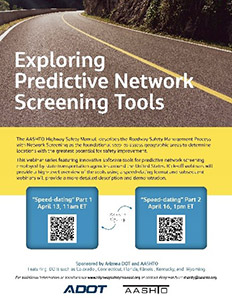
| The AASHTO Highway Safety Manual describes the Roadway Safety Management Process with Network Screening as the foundational step to assess geographic areas to determine locations with the greatest potential for safety improvement. Using modern technologies and software approaches, this process can be optimized to produce more effective and user-friendly outcomes. This webinar series features innovative software tools for predictive network screening employed by state transportation agencies around the United States. Kick-off webinars provide a high-level overview of several agencies’ tools using a speed-dating format and subsequent webinars provide a more detailed introduction and live demonstration for a smaller selection of agencies. To learn more or register for upcoming webinars, contact Kelly Hardy at khardy@aashto.org. Co-sponsored by Arizona DOT and AASHTO. |
HSM Domestic Scan Final Report (2018)
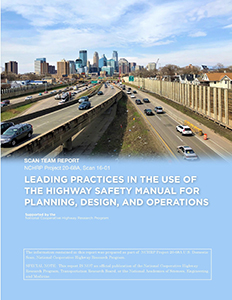
| The
Leading Practices in the Use of the HSM for Planning, Design, and Operations report, published in 2018, is intended to help state transportation agencies that have not yet begun to implement the HSM, are beginning to implement the HSM, or are looking to further enhance the implementation of the HSM within their agencies. Most of the recommended actions are also applicable to local transportation agencies and metropolitan planning organizations (MPOs) in similar situations regarding HSM implementation. The report includes a selection of recommended actions and best practices for effective implementation and integration of the HSM, and covers seven areas of interest: - Status and Policy,
- Training,
- Technical Function,
- Data,
- Safety Culture,
- Information Dissemination, and
- Achieving Performance.
Additionally, as a part of the scan, a
slide deck was created which summarizes the findings of the HSM domestic scan. |
Highway Safety Manual Lead State Initiative and User Guide
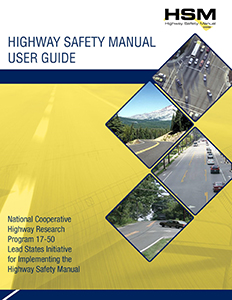
| The objectives of the NCHRP 17-50 Project were (1) to help with the widespread effective implementation of the HSM across the country through monitoring progress, (2) providing technical assistance, and organizing and facilitating two peer exchanges; and (3) develop an HSM User Guide based on the experiences and examples of the lead states. The Highway Safety Manual User Guide is a companion document to the HSM, developed under the Lead States Initiative (NCHRP 17-50) in 2014. The Guide was designed to support and provide examples and best practices for practitioners as they work to implement HSM practices. Designed and written primarily for analysts with basic knowledge of the HSM and basic to moderate knowledge of highway safety analysis procedures, it also contains insights that are useful to all practitioners. The guide includes three major sections: - the HSM overview,
- integrating the HSM into the project development process, and
- frequently asked questions.
Additionally, as part of NCHRP 17-50, a series of Peer Exchange Reports, Technical Briefings, and a webinar on the implementation of the HSM were created. These documents can be accessed on the TRB website and through the individual links below. Peer Exchange Reports Technical Briefings Webinar |
Integrating the HSM into the Highway Project Development Process (2012)
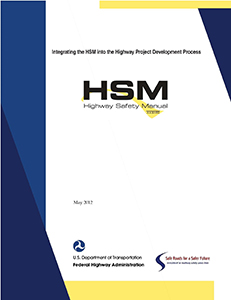
| The
Integrating the HSM into the Highway Project Development Process guide, published in 2012, provides information for state and local practitioners on how to integrate the HSM into their project development process. Each section provides an overview of some of the implementation opportunities for the HSM during each stage of the project development process. The HSM, integrated into agency processes and considerations, will support regional, state, and national fatality reduction goals alongside the goals of mobility, the environment, and other competing needs. |
Implementation Guide for Managers (2011)
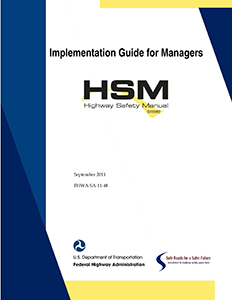
| The
Implementation Guide for Managers, published in 2011, is intended for managers of DOTs charged with leading and managing agency programs impacting the project development process and safety programs. This guide is based on lessons learned from early adopters of the HSM, and outlines what the HSM is (and is not), how it relates to other core technical documents and policies, and the potential benefits of its use. The guide includes three sections: - Introduction to the HSM,
- HSM Implementation Considerations, and
- HSM Implementation Opportunities in Program Development and Project Delivery.
|
FHWA Case Studies (2010)
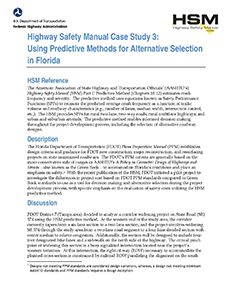
| The Federal Highways Administration (FHWA) has developed brief case studies of effective applications of HSM practices by five different state departments of transportation. Case Studies: |
Other ResourcesAdditional resources for implementation of the HSM are available from FHWA at the following locations. |
|
|
